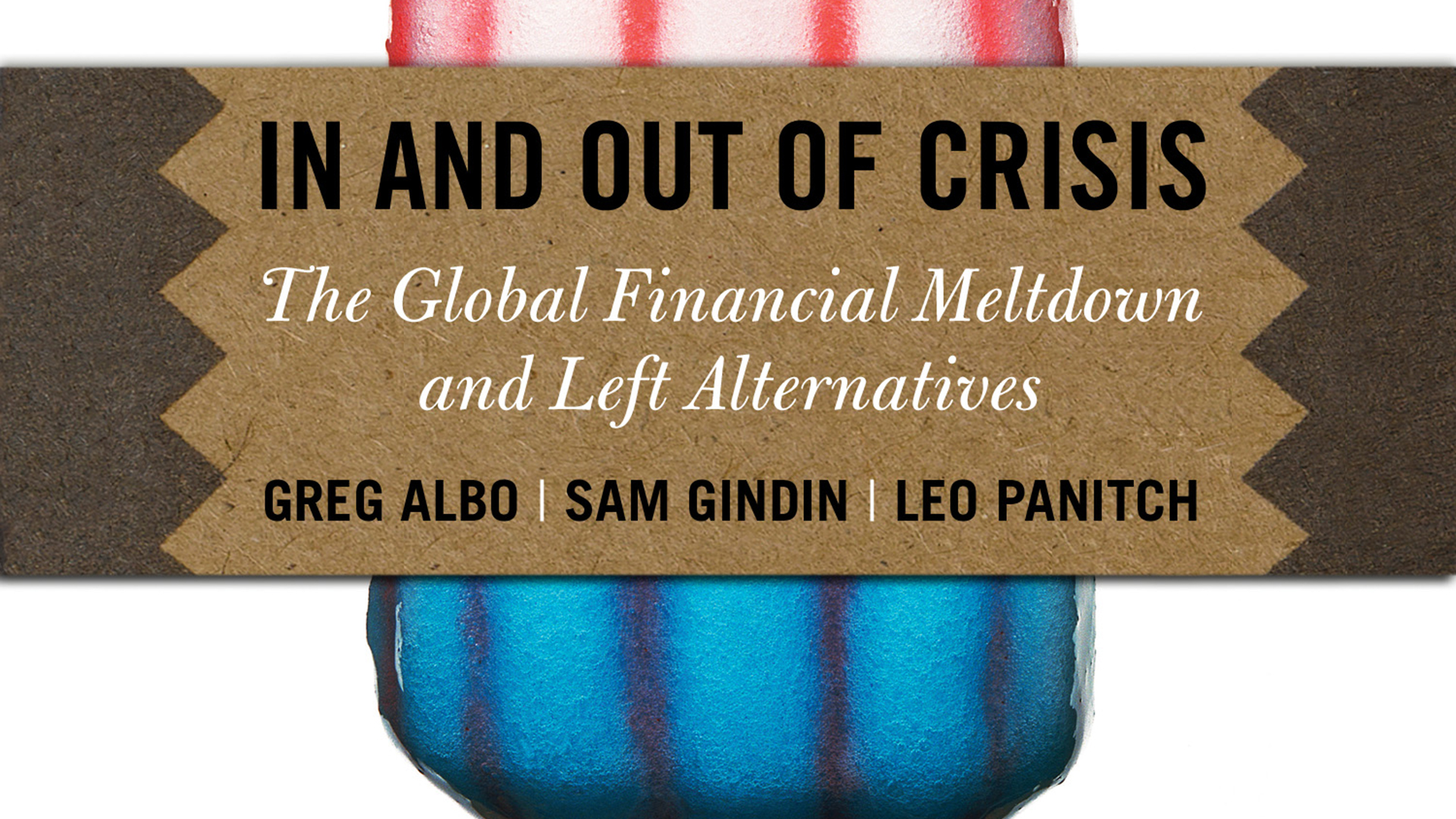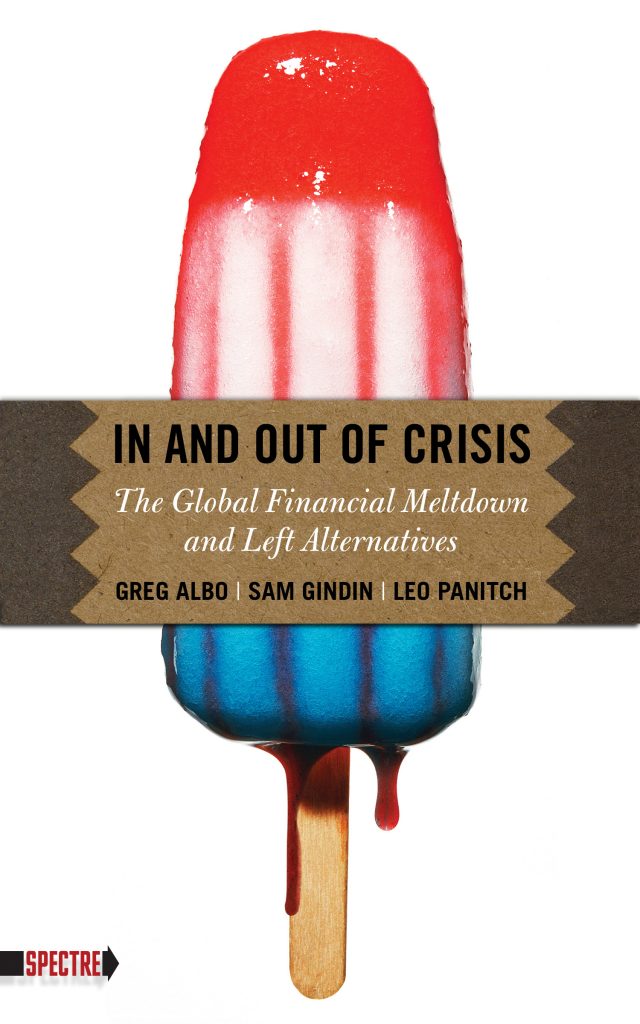By Carlo Fanelli
Alternate Routes: A Journal of Critical Social Research
In and Out of Crisis is a thought provoking, accessible and politically engaging contribution to debates on the origin, severity and historical significance of the so-called “Great Recession.” Furthermore, as the subtitle The Global Financial Meltdown and Left Alternatives suggests, Albo and authors provide an unapologetically socialist analysis of what to do about it. Albo, Gindin and Panitch remind the reader that the classical meaning of crisis is turning point, to which they ask: Has the crisis marked a turning point in the balance of class power and the organization of the state? Or can the political alliances and power structures that have dominated the last four decades be reconstituted in what so clearly has been a monumental crisis?
For the authors, the short answer to the first question is no and, for the second, yes. This book departs from the tendency of writers (both from the Left and Right) to view the current responses to crisis as somehow marking a return to Keynesianism, or in terms of states versus markets, finance versus industry. Instead, rather than lay emphasis on the economic determinations of the crisis, the authors seek to politicize and get at the social roots of the problem by moving beyond limited technical or policy solutions to capitalist crises by instead placing democratic and social rights at the centre of their analysis. As they state : “The interpretation in this book is quite distinct” (p.122).
Fortunately, the authors have preemptively summarized the outline of the book:
Chapter one explores whether or not we are currently witnessing the end of neoliberalism; chapter two engages in current debates regarding the nature of capitalist crises, and the relationship between the state, finance and production in a neoliberal era; chapter three traces the historical process through which, over a century punctuated by previous cries, the American State and finance developed in tandem, and came to play a new kind of imperial role at the centre of global capitalism; chapter four traces the development of the crisis that began in 2007 and explains the active role of the American state, both under Bush and Obama, in containing the crisis in ways that reproduced the structures of class inequality and power domestically and internationally; chapter five analyses how the relationship between industry and finance played itself out in the auto sector, bringing to the fore the full class dimensions of the crisis; chapter six reflects on the impasse of the North American labour movement and the implications for the North American Left; and Chapter seven tries to think creatively about alternatives, not least in terms of how advancing the case for democratic economic planning, including the nationalization of the banks and auto industry, must become integrated with demands for immediate reforms. (p.25)
If the reader does not have the time for chapters one through seven, chapter eight’s Ten Theses on the Crisis succinctly summarizes the gist of their arguments. For the purpose of this review, however, I would like to provide a glimpse of what makes In and Out of Crisis’ analysis distinct. Or, in other words, what are likely to be the major points of contention stemming from their investigation.
First, contrary to authors that claim that the New Deal was an attempt to impose greater ‘regulation’ or ‘controls’ upon capital, Albo et al argue that following the Great Depression of the 1930s, private banking institutions had been nurtured back to health in the post-war decades and then unleashed in the explosion of global innovations that have defined the neoliberal era. And that, despite the meltdown, “[t]he conditions that kept neoliberal policies in play for so long have not been exhausted or undone by the crisis” (p.17).
Second, taking aim at a broad spectrum of liberal, Keynesian, Minskian and orthodox Marxist views that posit the end of the American Imperium, a return to greater ‘regulation’ or the stagnation tendencies of ‘mature’ capitalist economies (such as Robert Brenner and the Monthly Review School for instance), Albo and authors argue that, if anything, the crisis has reconfirmed the world’s dependence on the American state and financial system as capital everywhere ran to the safe haven of the US Treasury bond. As opposed to the end of American hegemony or the birth of a multi-polar world, the resolution of this international crisis has rested fundamentally on the actions of the US state in leading a more or less coordinated response, and in the process integrating the G20 members into the US’s informal empire in what has been an extraordinarily dynamic period of capitalism.
Third, Albo, Gindin and Panitch provide a unique examination of the relationship between states and markets, industry and finance and, therein, the class relations that underpin them. Rater than viewing ‘financialization’ as narrowly superstructural, parasitic or speculative, or as a result of the tendency for the rate of profit to fall, they situate finance-led neoliberalism in historical terms in the sense that financial volatility actually becomes a developmental feature of neoliberalism that reinforces, rather than undermines the central position of financial interests in capitalist power structures. In their view, neoliberalism is understood as a “particular form of class rule and state power that intensifies competitive imperatives for both firms and workers, increases dependence on the market in daily life and reinforces the dominant hierarchies of the world market, with the US at its apex” (p.28).
Fourth, the authors claim that a new historical project must be placed on the agenda. In order to do this, the Left must come to the bitter realization that the forms of protest, means of organizing and daily practices of activism, most visible in the anti-globalization movements and world social forums, just aren’t working anymore. This means soberly reflecting on the impasse of the North American labour movement, in addition to the successful “disorganization” (on the part of capital) of old working class institutions (labour parties, cooperatives, benefit societies) that has been central to neoliberalism and which threatens to become a historic class defeat.
Throughout the book, Albo et al raise the question as to whether or not the Left can develop the confidence to think as big and radical as ‘they’—the ruling class—are doing in terms of both how workers see the future and what needs to be done to build the capacities to get there. “The way forward”, they argue, however, “is not to take one step first and another more radical step later, but to find ways of integrating both the immediate demands and the goal of systemic change into the building of new political capacities.” (p.114) As they remind us, “democracy is not just a form of government but a kind of society,” which unavoidably remains fractional and incomplete within capitalism (p.128).
A few questions, however, may beg further unpacking. In light of the shifting composition of the working class and the role of women’s reproductive labour, how would the expansion of collective social services such as in health care and education, for instance, impact women’s paid and unpaid life experiences given their position in the labour market as a whole and concentration in specific sectors?
Given the legacy of defeats and setbacks over the period of neoliberalism, how may unions—many trapped in erstwhile social-democratic parties and the constraints of formal union structures—find some basis of unity that could help shape collective struggles in working-class communities and connect the linkages between the employed and unemployed, and those denied a chance to work? What kinds of fresh organizational structures and emergent forms of activism throughout North America and abroad carry potential?
On the whole, In and Out of Crisis is all but certain to have a broad appeal to researchers and academics, as well as students and lay persons alike. The era of neoliberalism—that is, capitalist militancy, is by no means over. In fact, it seems to be gaining new momentum the world over. Albo, Gindin and Panitch, in their short but no less provocative book, do much to not only shed light on what led to the enduring socio-economic and political uncertainty, but provide a much needed analysis on what may need to be done in order to avoid such relapses in the future.
Back to Greg Albo’s Author Page | Back to Leo Panitch’s Author Page | Back to Sam Gindin’s Author Page







